

Annual Report 2024-25

This image: Children from a school in Zambia that is supported by Catholic Mission.
Cover image:
A young boy stands with strength in his village in remote Ethiopia, embodying hope for the future.
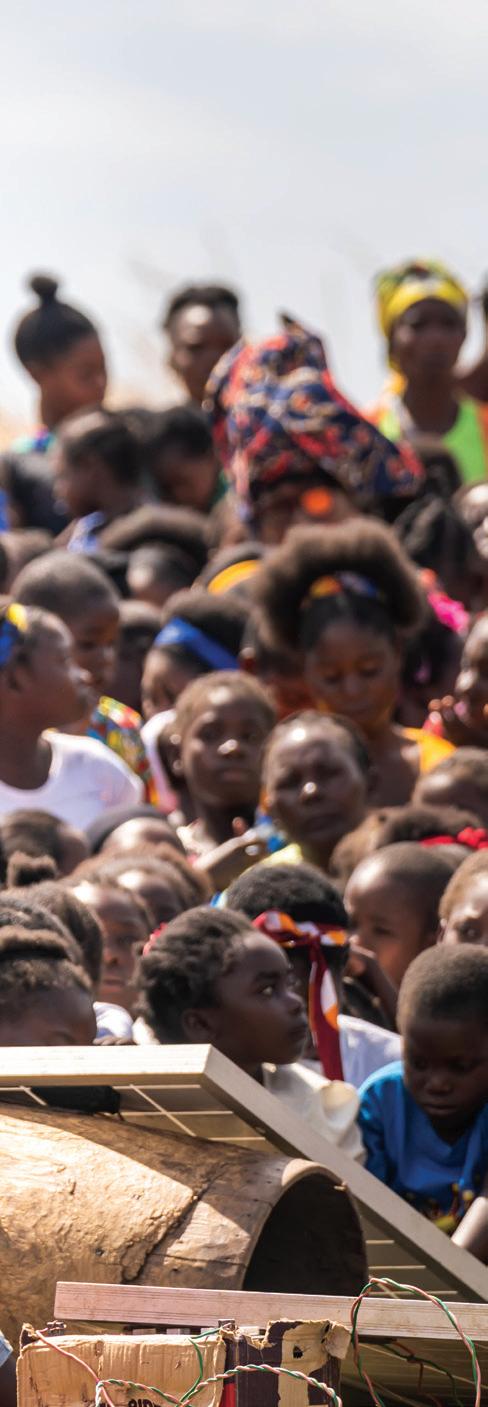


We Are Mission People, Organisation, Culture
Catholic Mission is the Pope’s international Mission agency in Australia. We partner with communities, helping them to flourish by supporting grassroots projects, including healthcare, education and faith formation, and being an active voice for human rights.
Our Vision
That all may have life in Christ.
“I have come that they may have life, and have it to the full.” (John 10:10)
Our Mission
As the Pope’s international Mission agency, we respond to the call to love God and to love our neighbour by forming individuals and communities as missionary disciples of Jesus, who share their faith in action and through prayer. We share in God’s mission to reach out and give life by sharing our personal and financial resources to:
• proclaim the Gospel
• serve people in need
• act for peace, justice and creation in partnership with local churches, so that all may have life in Christ.
“Love one another. Just as I have loved you, you also should love one another.” (John 13:34)
Our People

Jacqueline Toakley
Diocesan Director, Diocese of Armidale
“Working with Catholic Mission is a privilege. I’ve been especially blessed to travel overseas and see firsthand the love and dedication of our missionaries who serve God’s most vulnerable people. Over 10 years I’ve witnessed the transformative impact of bishops, priests, religious and lay people working with local communities to build skills and capacity. Their life changing work, and the generosity of our Australian donors who make it possible, is a constant source of inspiration and hope.”
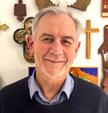
Peter Gates
Deputy National Director
“It is an honour both personally and professionally to be involved in the work of Catholic Mission. The staff, volunteers, the people and communities here in Australia and around the world that we serve are incredibly passionate, talented and inspiring. This work of mission leads us to encounter people who often live in the extremes of life. In the heartache of the sorrow or the joy there is the heart’s love that witnesses to God’s love, for us all. You can understand why it is a privilege and a blessing to be in this place of mission.”
A Message from the National Director Fr Brian Lucas
It is with gratitude that I present to you the 2024–2025 Annual Report, as my final contribution to Catholic Mission. After 10 years as the National Director, it is now time for me to move to another ministry. Having completed two terms, the maximum allowed, I leave with a deep sense of accomplishment, gratitude and a heart full of hope.
During my tenure, I had the privilege of travelling and experiencing true encounters with others, whether it was missionaries in rural Cambodia, supporters of Catholic Mission here in Australia, or fellow National Directors of the Pontifical Mission Societies across the globe. The warmth of these encounters is what gives me hope. Through the work of Catholic Mission, I witnessed more than just the funding of projects. I saw a genuine spirit of embracing our brothers and sisters and walking the journey of faith together.
Last year, during World Mission Month, Pope Francis gave us the theme ‘Go and invite everyone to the banquet’. In many ways, this reflects my journey at Catholic Mission. I was invited to the banquet and then called to go out and extend that invitation to others. In a similar way, our new Holy Father, Pope Leo XIV, has responded to this call. By accepting his role as the new shepherd of the Church, he has embraced the immense responsibility of serving the people, reaching out and inviting all to be part of this banquet of life.
As I reflect on my 10 year journey, I also reflect on the journey of the organisation, its growth and transformation. Two years ago, we initiated a synodal process to discern how our practice and operations could evolve to meet the organisation’s needs. As this journey continues, the improvements and growth we have experienced stem not only from the changes we implemented, but also from the spirit of synodality, participation, communion and mission that inspired them.
Much of my time as National Director has been guided by the vision of Pope Francis. I have witnessed firsthand the meaningful impact of integrating synodality into all aspects of Church life. At Catholic Mission, I saw many of my colleagues embrace this renewal, making deep and active listening a core part of how they turn their faith into action.
As we continue to co create impact with communities around the world, we do so with a firm commitment to being with one another and putting relationships first. One of the great achievements of this commitment last year, was
the deep relationship we built with the Apostolic Prefecture of Ulaanbaatar in Mongolia. In a country with only 1,500 Catholics, we walked alongside entire communities to help address some of their most urgent needs. By establishing strong, trusting relationships with His Eminence Cardinal Giorgio Marengo IMC, Brother Andrew Tran Le Phuong SDB and the community, we were able to bring warmth and hope to many people facing homelessness in the capital. This is just one small example of the incredible work taking place around the world.
Relationships are key and by building them with one another we can create a better world. This is a central concept in our Interfaith Encounters program, which recently received a grant from Multicultural NSW to continue delivering meaningful impact by building bridges of understanding and friendship between communities.
These are just a few examples of how we use our burning passion to bring our faith to life through action.
As I take this opportunity to thank you all for your wonderful support, I also reflect on this Jubilee Year of Hope and the 2025 theme for World Mission Month: ‘Missionaries of hope among all peoples’. I leave Catholic Mission with hope for the future, but also with certainty, because I have personally witnessed the great work each and every one of you does daily to bring faith into action, to live and witness God’s mission.
Yours in mission,
Fr Brian Lucas National Director

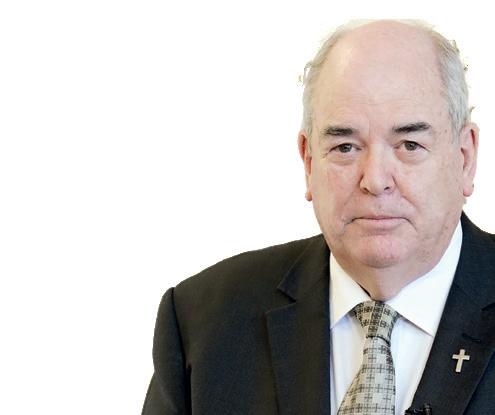
Impact Snapshot
With your help we supported: 188 projects in 36 countries
Number of projects by region
South America and the Carribean Projects in Working with Children 2 Working with Communities 2
4
Africa
Working with Children 53 Working with Communities 5 Working with Church leaders 11 Projects in
69
Through our international network of the Pontifical Mission Societies, we contributed to support:
2,685 projects supporting children
76,284 seminarians
6,575 novices
968
66,929
84,855
1,681
Our Global Network
Faith knows no borders. It calls us to work together across nations, cultures and communities in mission and service.
In 2024, Catholic Mission, as the Australian arm of the Pontifical Mission Societies (PMS), deepened its connection to this global network that acts on behalf of the Holy Father to support missionary work and efforts worldwide.
In his World Mission Sunday message, Pope Francis chose the theme, ‘Go and invite everyone to the banquet’. It was a timely reminder of the universal call to welcome all people into the shared mission of faith, hope and service.
This year, Catholic Mission co produced the fourth edition of the World Mission Sunday global video, as well as the design and visual identity supporting Pope Francis’ message.
Rooted in a spirit of welcome and solidarity, this global campaign offered an inspiring call for missionary actions and initiatives across the world. It was central to our preparations for 2025, helping to ensure that the mission message reaches every community with unity and local relevance, by building bridges of understanding and compassion across cultural boundaries.
As the Australian agency, we proudly led several additional initiatives to unify and strengthen the global message of mission. Through tailored advice, training and the development of shared digital resources, we collaborated with smaller PMS offices to enhance their messaging, strengthen brand presence and develop campaign ready materials. These efforts aimed not only to build technical capacity but also to deepen trust, foster collaboration and journey together in mission.
This work continues to remind us that Catholic Mission’s role in the global network is more than operational. It is a shared journey of faith, solidarity and service. Our ongoing goal is to help build a more cohesive and empowered global network where local stories are heard, and missionary efforts are strengthened through connection and collaboration.
As we enter the pontificate of Pope Leo XIV, carrying forward the legacy of Pope Francis, we continue to walk together and co create a future where faith transcends borders, and every community is invited to the banquet.
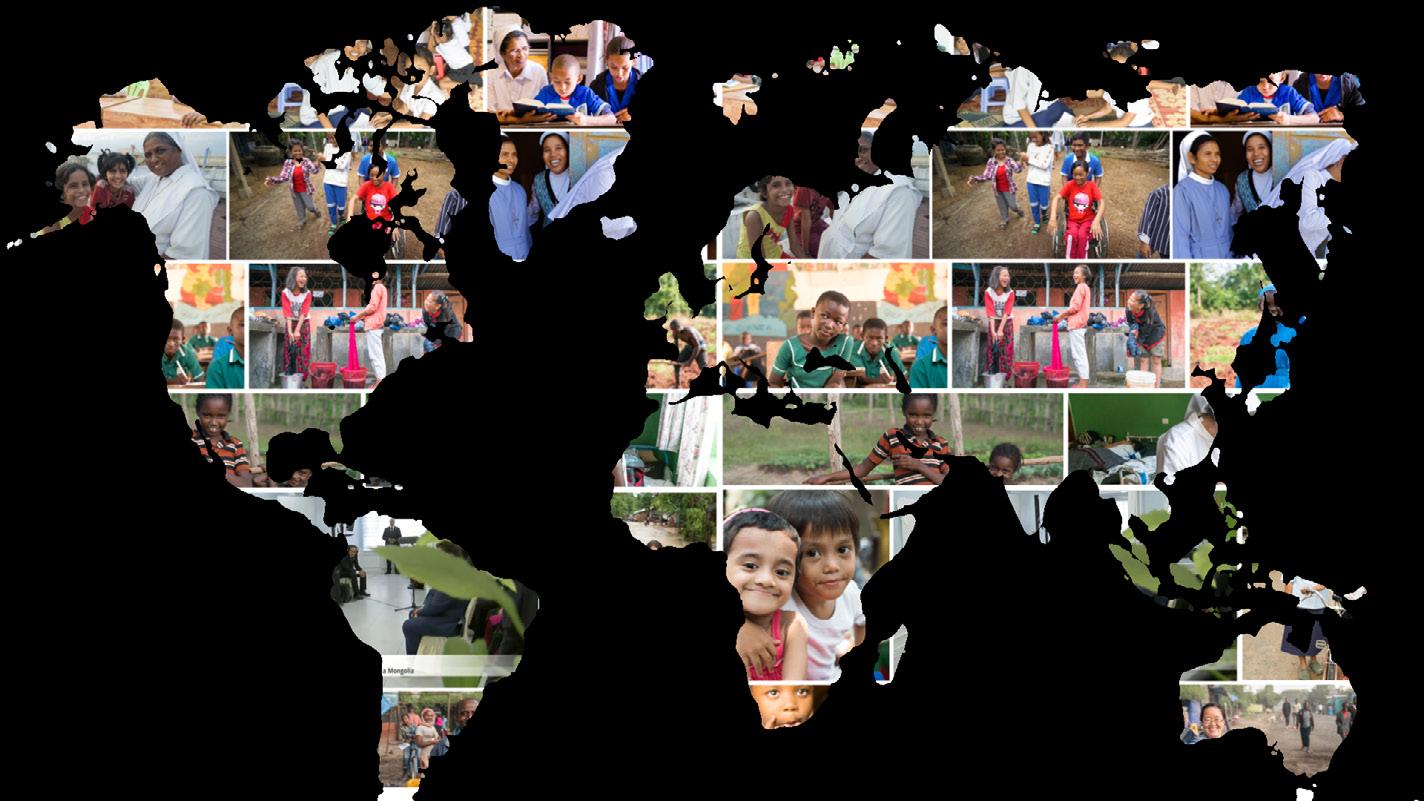
This
everyone Go
The Gospel MARKED
image: Illustration of the 2024 World Mission Sunday theme, chosen by Pope Francis and shared worldwide to promote inclusion and unity.
Go and invite
everyone

calls everyone to the divine banquet
Mission Development Work
Catholic Mission’s unique Mission Development Framework, which underpins our engagement with partners around the world, blends Catholic Social Teaching and living Gospel values, while staying connected to best practice in the international development space. In the words of Pope Leo XIV, ‘Do not limit yourself to helping the needs of the poor but announce to them the love of God with words and testimony’.
The United Nations Sustainable Development Goals (SDGs) offer a powerful vision for a better world, one where no one is left behind. They focus on ending poverty, improving health and education, ensuring equality and building sustainable communities by 2030. However, these goals can only become a reality through grassroots efforts and meaningful partnerships where people listen to and walk with local communities. This is exactly where Catholic Mission comes in.
As the Pope’s international Mission agency in Australia, Catholic Mission supports transformative, community led initiatives in more than 160 countries. Inspired by the Gospel and grounded in values of dignity, compassion and justice, Catholic Mission places long term development at the heart of its work. From health and education to social inclusion and environmental sustainability, every project is driven by local knowledge and a shared commitment to people flourishing.
In 2024, we were invited to reflect on the theme of ‘Go and invite everyone to the banquet’ for World Mission Sunday. Our work is underpinned by focusing on community and relationship building, extending invitations to the people living on the peripheries of society to join us in building brighter futures.
A powerful example of this mission in action is the Don Bosco Industrial Training Center in Mongolia, where Catholic Mission is aiming to address SDGs such as access to quality education and reducing inequalities. Through the Center, students from low socio economic backgrounds are offered affordable vocational training that equips them with practical skills to gain trade qualifications or enter professional employment opportunities. This opportunity not only empowers them to achieve financial independence but also helps break the cycle of poverty affecting their families.
Living out faith in action, bringing technical skills and experience, Catholic Mission plays a pivotal role in supporting the universal Church, specifically in 1,100 mission territories which are predominantly in developing countries.
What sets Catholic Mission apart is its commitment to localisation. The goal is not to provide quick solutions, but to empower local leaders to guide and sustain their own development. This model has already proven successful in Cambodia, where Catholic Mission opened a Regional Mission Development Office. Now the office is fully staffed and led by local professionals who assist local projects to grow and flourish across the Asia Pacific region.
It’s an approach that resonates with the Church’s renewed call to be outward facing and missionary in spirit. As Pope Leo XIV recently affirmed in an address in St Peter’s Square:
We have to look together how to be a missionary Church, building bridges, dialogue, always open to receiving with open arms for everyone, like this square, open to all, to all who need our charity, our presence, dialogue, love.”
This vision of a missionary Church, one that walks alongside and is in dialogue with one and all, helps to guide our life changing mission development work.
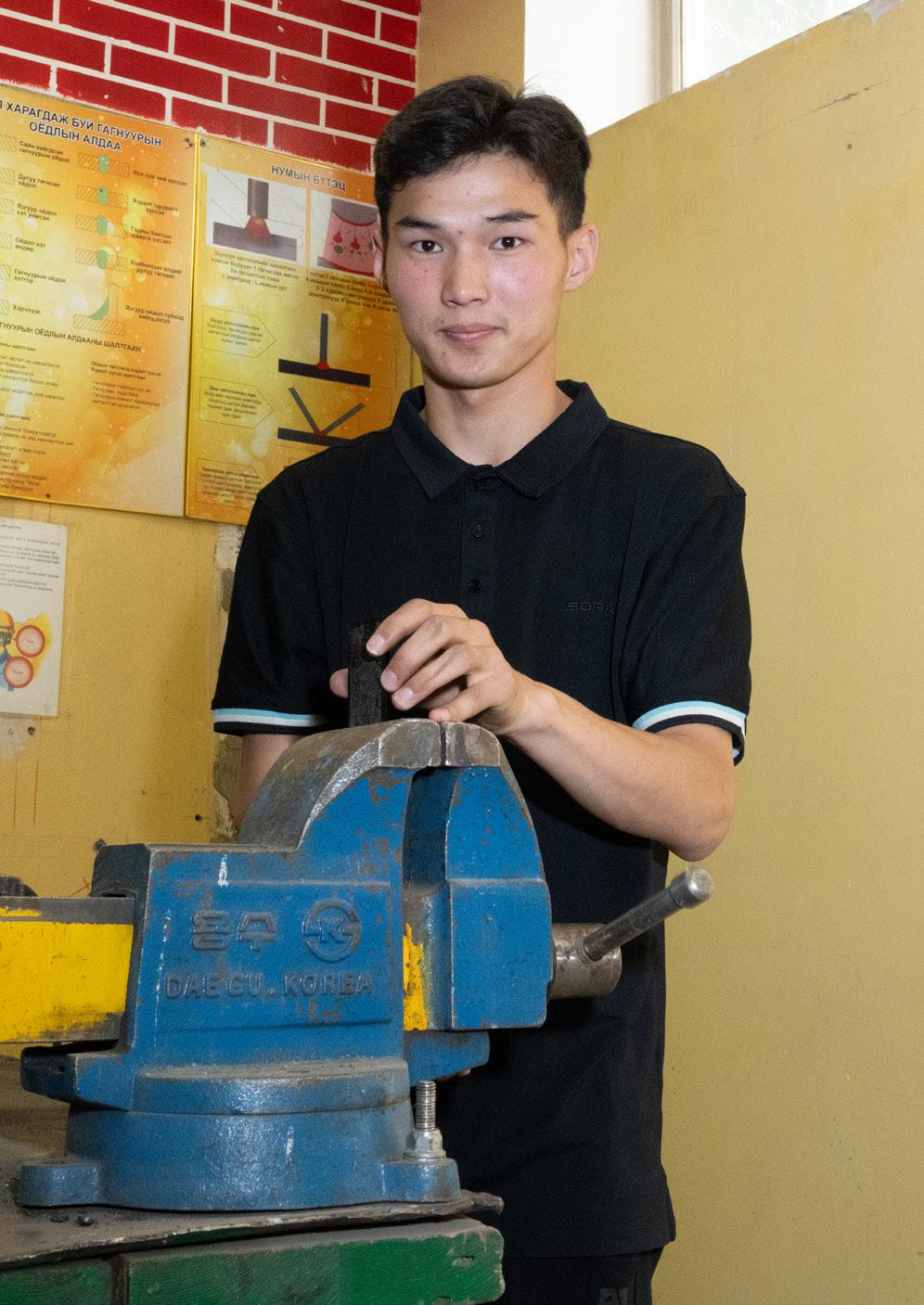
This image: A student at the Don Bosco Industrial Center learning skills that will help with future employment opportunities.
Work with Children

Landlocked between Russia and China, Mongolia is well known for its harsh weather, with winter temperatures often dropping below -30°C, creating challenging living conditions. The Mongolian people show extraordinary perseverance and resilience, even as some communities face economic hardship, limited access to services, poverty, homelessness and gender-based violence.
These conditions have shaped unique ways of life in Mongolia. Alongside the struggles, tradition, culture and diversity, deep religiosity continues to grow.
From just 14 Mongolian Catholics in 1995, the community grew to 1,500 by 2022. Missionaries have played an essential role in this growth, walking with the people and sharing Christ with them.
Among the projects established by missionaries is the Don Bosco Caring Center. Founded by the Salesians of Don Bosco in 2003, it reflects St Don Bosco’s philosophy of ‘reason, religion and loving kindness’.
In the capital, Ulaanbaatar, the Center provides vulnerable children with a safe and nurturing place to call home. Here, they receive education and ongoing support, helping them move beyond difficult circumstances. The Center offers a secure environment where children can grow in confidence and develop a sense of purpose, something every child deserves.
It currently supports 24 children aged 5 to 18 years with education, meals, emotional support and community activities. Most of the children have experienced hardship, including family violence, loss and instability. At the Center, they have found a place to begin healing and to rediscover a sense of belonging and hope.

Namdag Ivgeelt, a social worker at the Center since 2021, explains:
In Mongolia, many children become victims of domestic violence, making them lose any interest in being at home or forcing them to run away. For 40 per cent of the children, we don’t know where their parents are. For the others, alcohol addiction, poverty, and domestic and family violence mean their parents are unable to take care of them.”
Recently, the Center required urgent funding to cover staff salaries, maintain core services, and provide essential resources such as meals and safe transportation.
Thanks to your solidarity and generosity, the Center’s operations have been sustained and it continues to deliver life changing care. Children are receiving nutritious meals, school uniforms, additional clothing and access to a new bus, vital for safe travel, especially during the harsh winter months. Staff salaries have been secured for the foreseeable future, including the addition of an English teacher to support students’ language development, and night staff to assist with homework.
To help ensure the Don Bosco Caring Center is never at financial risk again, Catholic Mission’s Programs team is working with the Center’s leadership to explore income generating activities that will help it become self sufficient in the future.
This image: A child from the Don Bosco Caring Center drawing.
$2.3m distributed to support children’s programs
101 projects supported in 20 countries
66,929 children supported
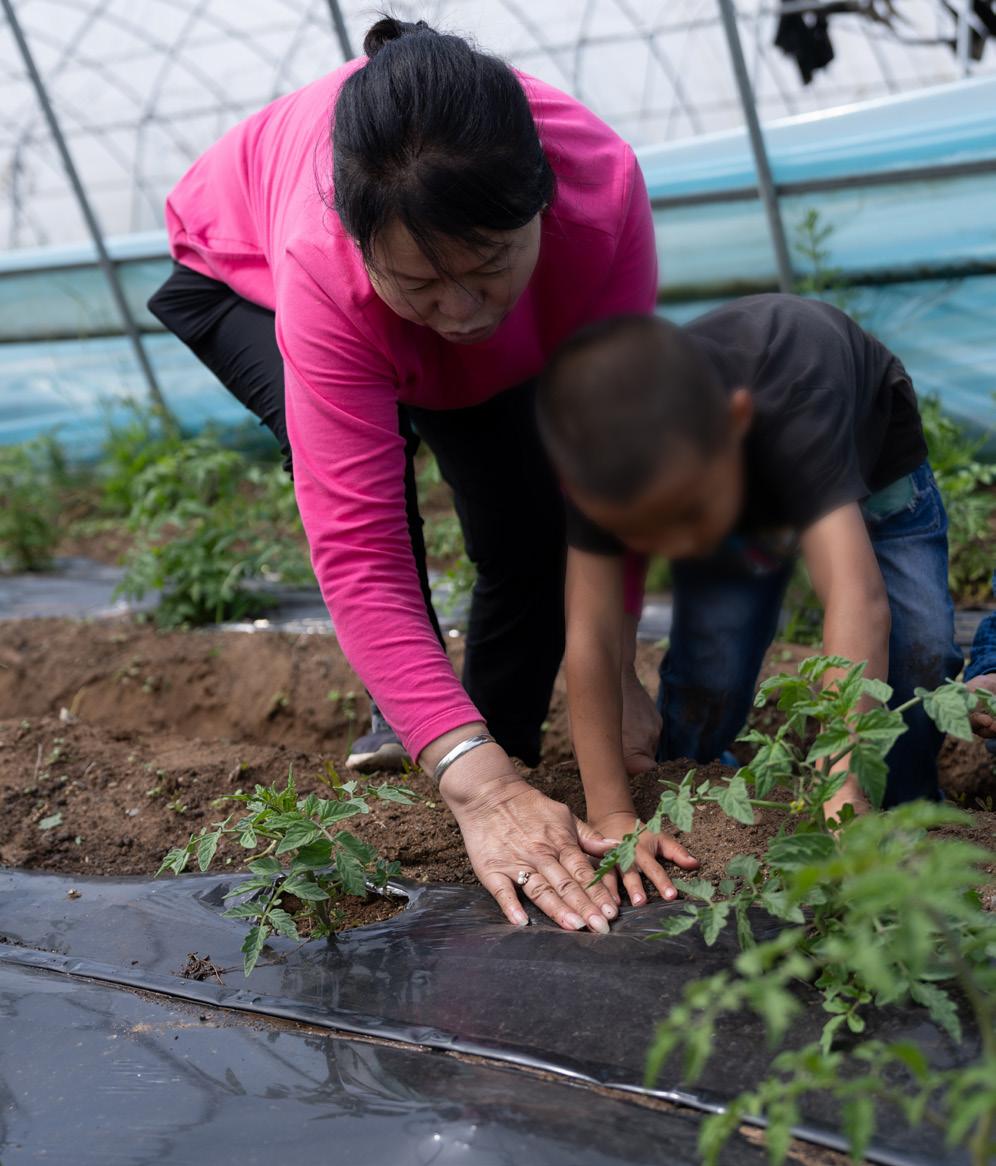
This image: Namdag teaches a child gardening skills at the Don Bosco Caring Center in Mongolia.
$3.4m distributed to support children’s programs
62 projects supported in 20 countries
84,855 community members supported

This image: A beneficiary of the House of Mercy enjoys a nourishing meal while sharing a heartfelt moment with staff and fellow beneficiaries.
Work with Communities

In the heart of Ulaanbaatar, Mongolia, the House of Mercy has become a powerful symbol of hope and healing for people experiencing homelessness and family violence. In partnership with His Eminence Cardinal Giorgio Marengo IMC, Brother Andrew Le Phuong SBD, the local Catholic Church, and the broader community, Catholic Mission continues to support this vital work on the ground.
The centre was inaugurated by Pope Francis during his historic apostolic visit to Mongolia in 2023, where he blessed the House of Mercy and highlighted the uniqueness of the project.
“The House of Mercy is meant to be the point of reference for a variety of charitable works, hands outstretched towards our brothers and sisters, struggling to navigate life’s problems,” he said. “A safe haven, in other words, where people can find a listening ear and an understanding heart. While not unlike many other initiatives supported by Catholic institutions, this new undertaking is also special, since here it is the particular Church that carries out the work. Coordinating the efforts of all the missionary groups, while preserving a clearly local identity as an authentic expression of the Apostolic Prefecture as a whole.”
Since opening its doors on June 5 2024, the House of Mercy has welcomed more than 48,680 people in need. Operated by a small, yet dedicated team of eight, including two doctors, the centre currently runs from Monday to Friday with plans to extend services into the evenings. Each day, more than 100 meals are prepared and served, with some beneficiaries offering their time in the kitchen to give back in gratitude and solidarity.
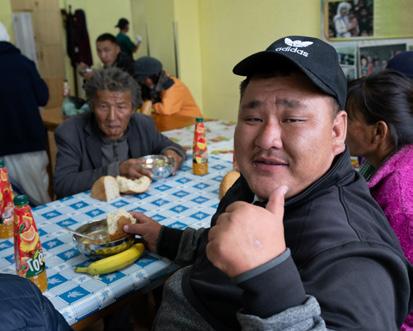
Br Andrew, the Project Director, describes the mission of the centre as:
Revealing the love of Christ to everyone who comes through our doors, without distinction.”
Beyond providing food and shelter, the House of Mercy offers medical first aid, counselling, and a warm, welcoming environment grounded in gratuitous love and selfless service. With more than 150 medical consultations each month, the clinic plays a vital role in addressing the urgent healthcare needs of the community.
The centre’s impact also extends into the future, with students from the Don Bosco Industrial Training Center volunteering twice a week. Their contribution helps to create a cycle of mutual care, where young people are formed in compassion while offering practical support to people in need.
Marking its first anniversary as a service provider, the House of Mercy has grown into more than a place of shelter. It has become a vibrant hub of community, compassion and dignity, where lives are being transformed through the simple yet profound act of being seen, supported and loved.
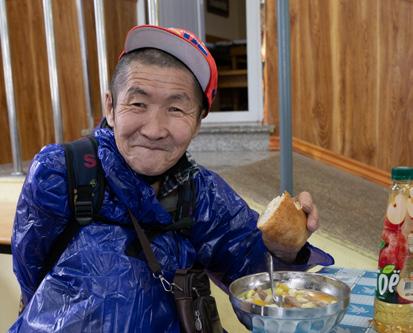
This image: A warm meal shared inside the House of Mercy brings comfort and hope.
This image: A beneficiary of the House of Mercy having a warm meal, nourishing both body and heart.
Work with Church Leaders

In the Jubilee Year 2025, Pope Francis invited us to embrace hope and renewal, reminding us that ‘in the pilgrimage of Christian life, a new beginning is always possible’. In this spirit, Catholic Mission marked the Jubilee by sharing the stories of seminarians in Timor-Leste and by actively providing them with tangible support. Their journey of renewal and hope prepares them to become Church and community leaders of tomorrow.
At the Major Seminary of St Peter and Paul in Dili, 294 seminarians are currently undertaking formation, supported by nine dedicated formators. Many of these young men grew up in rural farming families and face the daily pressure of contributing to their household. Young men are often designated as the main providers, carrying the heavy responsibility of supporting ageing parents and younger siblings.
However, some are choosing a different path. By entering the seminary, they are not only responding to a spiritual calling but also seeking new ways to uplift their families and serve their communities.
Many seminarians in Timor Leste face a difficult decision. Coming from modest backgrounds, choosing a vocation means sacrificing immediate financial security. Their families also make significant sacrifices to support their sons’ studies. Yet deep in their hearts they know that by responding to their calling, their sons will fulfil their purpose and give back generously to the Church and society.
His Eminence Cardinal Virgílio do Carmo da Silva SDB, Archbishop of Dili, understands these challenges intimately, having once navigated himself the struggle of being a young seminarian in Timor Leste.
With more than 40 per cent of the population living below the poverty line, the Church in Timor Leste plays a crucial role in addressing both spiritual and practical needs. Priests are not only pastoral leaders but often the backbone of social outreach, running schools, clinics and development programs, particularly in rural and remote areas.
The Church since the history until today, always the contribution of the Church to the society in two big areas. First in the education, second in the social life of the people. Throughout the history until now in our post-independence, the Church continues working in this rhythm with our own ways and means, with all this difficulty that we are facing,” says Cardinal da Silva.
Now in a leadership role, Cardinal da Silva strongly advocates for a more self sufficient Church. His vision is centred on providing quality education and formation for seminarians and clergy, fostering a stronger and more resilient Church for future generations.
“How to help the Church of Timor to be more independent? It should not be about continuously creating this constant dependence, but about how, in cooperation with Catholic Mission, we can also help so that in 5, 10 or 20 years — with the help of Catholic Mission — the local Church can grow. Capacitate the local Church to be more able to help economically, humanly, and to be more self sufficient for the future,” he says.
Through your support this year, we have been able to provide greater financial stability to the seminarians of St Peter and Paul, enabling them to pursue their calling without creating additional financial burden on their families, and to help secure the Church in Timor Leste more independence in the future.
$521k distributed to support programs for future Church leaders
25 projects supported in 12 countries
1,681
future Church leaders supported

This image: A seminarian in formation at the Major Seminary of St Peter and Paul in Dili, Timor-Leste, preparing to serve God’s people with faith and dedication.
Work in Mission Formation and Education

In Redemptoris Missio, Pope Saint John Paul II described the role of the Missionary Union as the ‘soul’ of the Pontifical Mission Societies, with the important purpose of supporting and promoting the other societies. It is the ‘why’ of our work that drives us to continuously reach out.
Led by our hearts, we put our hands into action to create lasting change. Through our outreach work we have aimed to implement more collectively driven action, where co design, active and deep listening, and partnerships are at the core of how we operate.
It can be witnessed in our efforts to bring healing and reconciliation in our relationships with Aboriginal and Torres Strait Islander peoples. Through the rollout of our Truth Telling program, the creation of Train the Trainer sessions to maximise our reach, and our organisational commitment to our Reconciliation Action Plan, our work is guided by the power of the synodal process.
This process continues to guide us in our relationships with one another. It aligns with the ongoing work of the Plenary Council in Australia, as we provide professional development opportunities across many dioceses in Australia to support the implementation of the adopted motions.
As we reflect on the impact we have had on the hearts and minds we have reached, we realise the importance of passing on this knowledge without limitation. We have imagined a space of encounter where people involved in formation for mission can share their insights and wisdom. Together we are building a living repository of useful resources to ensure this knowledge continues to be shared across Australia and the world.
This commitment led us to create formation.org.au, a professional membership association for formators. By supporting this initiative, we have committed to sharing our long acquired knowledge and resources to foster collective wisdom.
formation.org.au is a courageous and hope-filled initiative. It offers the whole of the Church in Australia an opportunity to connect and collaborate on the work of formation, to be creative, and to do so emboldened by the Holy Spirit, who gives us courage,” shared Lana Turvey-Collins, the Lead Facilitator of formation.org.au.
Mission is the driving force for many of us in our work and daily lives, but it can sometimes be difficult to define or fully grasp its implications. To make this concept more accessible, we developed ‘Introduction to Mission’ in partnership with Broken Bay Institute and the Australian Institute of Theological Education. So far, this course has reached more than 120 educators and continues to be adopted across a variety of sectors.
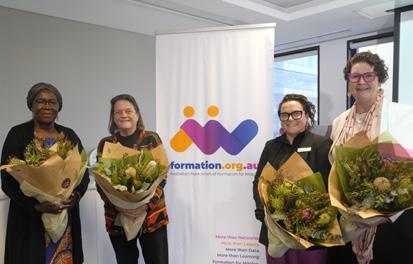
Mission can be found in many things, especially in the relationships we build with one another. These encounters can be challenging when differences exist between people. This is particularly relevant in Australia, the second most multicultural country in the world. To foster dialogue and build connections, we must first understand our differences and then work to create bridges.
Our Interfaith Encounters program provides a platform for young people to do just that, in a safe and supportive environment. Recognised by Western Sydney University, the program has already demonstrated its deep impact. It fosters more inclusive communities and contributes to a better future. The program recently received a grant from Multicultural NSW to expand its reach, including more schools, opening dialogue with Judaic institutions, and involving First Nations partners.
While this is only a brief snapshot of our work this financial year, it highlights the breadth of programs and initiatives guided by our faith and beliefs as we continue to build God’s kingdom.
This image: Lana Turvey-Collins (right) with keynote speakers at the inaugural formation.org.au event, from left, Dorothy Makasa, Lisa Buxton and Kelly Humphrey.
120+
educators enrolled in our Introduction to Mission course
218
students involved in Interfaith Encounters program

I personally feel like I’ve come out of this program with a renewed sense of community, as something that’s not just defined by religion, but also something that’s defined by the human experience in general, something that we all share. I also feel like it’s been beneficial to learn about this in practical ways. See how the faith is practised not only to observe the differences, but especially the similarities which overpower the differences in every way,” shared a student from St Benedict College, NSW, as they reflected on their experience in the Interfaith Encounters program.
This image: Through the Interfaith Encounters program, St Benedict College students promote respect and unity among different faiths.
Engaging with Schools
Engaging with schools is a key priority for Catholic Mission. By continuing this work and connecting with younger generations, Catholic Mission helps to build bridges that carry forward the mission of building the Kingdom of God.
Guided by the values of Catholic Social Teaching, Immersions and Interfaith initiatives and programs like Socktober focus on living out our faith in action. Each initiative aims to engage the heads, hearts, and hands of young people, helping them grow into compassionate and socially aware adults.
In 2024, students from 620 schools across Australia took part in Socktober, our annual flagship school engagement initiative, realising that their actions can create positive change for those in need. Acting as a catalyst for students, schools and their communities to take action and raise funds, they raised the incredible amount of $607,000, marking an exciting milestone in the number, awareness and enthusiasm of schools and dioceses embracing the initiative.
The increase in school and community participation saw remarkable engagement from many dioceses, with schools and communities from Cairns, Darwin, Wilcannia Forbes, Armidale, Rockhampton, Maitland Newcastle and Lismore recording their most engaged years to date.
More than the funds raised, students are now carrying with them the teachings of caring for one another and the belief that together we can create meaningful change.
Angus Rowan, National Schools Engagement Manager, has seen firsthand the power of Socktober to connect students to the global mission of supporting people in need.
$607k
raised in schools across Australia
620
schools engaged with Catholic Mission

Through Socktober, students engage with global issues like poverty and inequality in a meaningful way, which helps foster empathy and social awareness. They not only deepen their understanding but also learn how small actions, like fundraising and advocacy, can lead to real, lasting change,” he says.
To engage broader school communities, Catholic Mission’s Youth and School Engagement Team, in collaboration with school communities and diocesan Catholic Education Offices, hosted a series of launch events across the country to raise awareness and inspire local action. Events in the Maitland Newcastle, Toowoomba, Parramatta, Broken Bay, Brisbane and Hobart dioceses were particularly successful, bringing people together to share their passion for the initiative and make a difference.
In addition to the launch events, our team delivered a series of impactful Student Formation workshops. Across 195 workshops in 107 schools, students were empowered to become compassionate leaders in their communities. Each workshop not only educated students on important global issues but also inspired a deeper sense of purpose, responsibility, empathy and a drive to make a positive impact.
Socktober continues to demonstrate the difference young people can make when given the tools, knowledge and opportunity. Through the power of sport, community and faith, students across Australia are not only learning about global mission, they are becoming leaders in it.
This image: A child from the Don Bosco Caring Centre kicking the official Socktober sockball.
Immersions
destinations on offer for an immersion
students and staff participated in an immersion
Catholic Mission’s Immersion program continues to be a powerful catalyst for transformation, not just for the individuals who take part, but for the wider communities they return to.
More than just a trip, an immersion is an experience of encounter. It invites students, educators and adults to walk alongside communities in remote Australia and overseas — listening deeply, learning humbly, and returning with a renewed commitment to justice, empathy and faith.
At the heart of every immersion is impact. Participants come away with a broader worldview, a deeper connection to faith, and a sense of responsibility that lasts far beyond the journey.
For St John the Evangelist Catholic High School in Nowra, NSW, having their students take part in a Catholic Mission immersion is now part of their tradition, as a step towards becoming more compassionate adults as they start their transition out of high school. Every year, a group of 10–15 students from Year 11 take part in an immersion to the Northern Territory.
As one student, Bridget, shared, “I feel like I have a totally different perspective on a lot of things, and I feel like if I didn’t go on immersion, I wouldn’t think twice about a lot of things… it’s just so insightful.”
The domestic immersion provides the opportunity for students to deeply engage with Aboriginal culture and history, often for the first time. Joshua explained, “It was interesting to see the society and culture aspect of these communities… I’m expecting to learn a lot about Aboriginal spirituality and kind of get a grasp on our history and Australia’s ancient history.”
These moments of discovery are rarely easy.
The main challenge I faced was stepping out. You’re away from those things you know… and you’re with a different group of people. That really challenged me. But it worked out, and I definitely drew a lot from it,” said one participant.
Facilitators accompany participants throughout the journey, offering pastoral care and helping to make sense of complex experiences. David Muller, a long time facilitator, explains, “Information and knowledge are the key to solving injustice.
If people know more about a situation, they can make an informed decision… and that’s what immersions do.”
Educators are also part of the journey, as they experience the trip themselves while also witnessing the students grow from the experience. Wayne, the Principal who has accompanied several groups of students to the Northern Territory over the years, shared, “Witness is an important part of the Catholic faith. And that’s what we’ve been doing in the last few days. We’ve been witnessing with the locals and we’ve been present to them as we’ve been learning from them as Catholics. That’s really important to walk with people and learn from them. There is much deeper understanding that we don’t get unless we walk with people.”
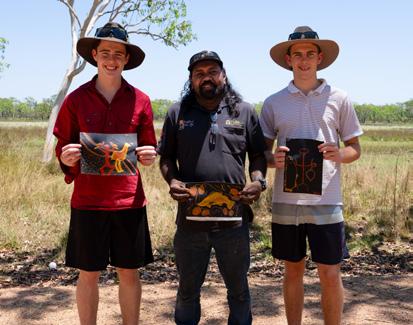
It is now a well established tradition in the school, with siblings travelling one after the other as they grow up. Josh was the second from his family to travel, following his sister two years prior, an important experience their mother valued.
“Josh came back a whole different person,” she reflected. “He’d grown and became more independent.”
As the program continues to grow, so too does its impact. These ‘eye opening’ journeys are forming compassionate leaders, grounded in faith and inspired by justice.
This image: Students from St John Evangelist Catholic High School proudly share their drawings from the immersion activity with their facilitator, celebrating connection with First Nations culture.
Engaging with Parish Communities
As the Pope’s international Mission agency in Australia, we are part of a global network that supports more than 130,000 missionary outreach stations worldwide. The funds assist projects ranging from healthcare and education to the formation of the Church’s future leadership. This support enables missionaries to continue their work on the ground and empowers communities and individuals to thrive.
To explore the heart of this mission, we spoke with Bishop Tim Norton SVD, Bishop of Broome, about his own missionary journey and the impact he has witnessed over the years.
Bishop Tim is a member of the international missionary congregation, the Society of the Divine Word, where he has served for more than 40 years. His journey in mission has taken him across the globe, from pastoral work in Mexico to leading renewal courses in Italy, and serving as provincial leader here in Australia. In 2021, he was appointed Auxiliary Bishop of Brisbane, and in October 2024 he accepted the call to serve as the Bishop of Broome. He brings with him a wealth of international experience, a deep commitment to formation and renewal, and a strong pastoral heart shaped by decades of mission.
The congregation I belong to, the Society of the Divine Word, has about 6,000 members worldwide, and we’re present in over 60 countries. We were originally founded by a German priest in 1875. Today, we live in international communities, and many of us work outside the culture in which we were born. That’s part of our calling,” said Bishop Tim.
This global to local spirit is something Bishop Tim sees reflected in Australia’s multicultural Church.
“Coming back to Australia, I’ve found it even more multicultural than the country I left,” he said. “That diversity brings richness, but also challenges. We’re learning how to adapt to a much more multicultural Church.”
In Broome, where he now ministers, this diversity is especially vivid.
“Even in Broome, there’s incredible diversity, different ethnic groups, Aboriginal communities with distinct tribal identities, and migrants from all over the world,” he said.
One powerful example of faith and culture coming together is the ‘Missa Kimberley’, a liturgy developed in close collaboration with local communities and rooted in Aboriginal spirituality. “It really is a beautiful and meaningful way to gather,” Bishop Tim said. “It uses language that people feel is truly theirs. It includes concepts they identify with.”
The liturgy was recently submitted to Rome to be formally recognised as a legitimate Mass of the Catholic Church.
“This form of liturgy allows people to hold both parts of their identity together,” he said. “They’re Aboriginal and they’re Catholic, and they’re clear that they don’t want to lose either.”
For Bishop Tim, inclusion is essential to Christian community.
968
parishes partnering in World Mission Month
$1,525,890
funds raised in parishes across Australia supporting the work of the missionary Church both locally and overseas.

“Whether we’re talking about parishes or any kind of Christian community, I think it comes down to consistent and intentional efforts to include people, especially those who are different or on the margins.”
From small, remote communities to multicultural cities, the Church plays a vital role.
“In all of these contexts, the Church plays an important role in reconciliation and healing,” he said. “These are sacred opportunities to return again and again to the basics of Christian life, following Jesus, building peace, and helping people reconnect with each other and with their faith.”
Bishop Tim sees great potential in the Church’s role as a platform for storytelling and deep listening, especially for First Nations peoples and young people.
“Everyone needs their story to be told,” he said.
“The Church can help by putting some frameworks around that so stories aren’t just heard, but respected.”
In reflecting on his own path, Bishop Tim is clear that mission is not confined to overseas projects.
“Mission is very much at home,” he said.
As the Australian Church landscape evolves, parish communities continue to provide places of belonging and welcome. Composed of diverse languages, cultures and generations, they bear witness to the love of God and the love for one another. There are many signs of hope in the creativity, resilience and hospitality of these communities.
As Bishop Tim reminds us, the Church’s mission today is not only about presence but also encounter, by becoming communities that listen, include and walk together in faith.
This image: (L–R) Bishop Tim Norton with Joshua Lourensz, Executive Director of Catholic Social Services Victoria; Anne Chellingworth, Pastoral Ministry Engagement Officer for the Diocese of Cairns; and Estela Padilla, keynote speaker at the 2025 Mission: One Heart Many Voices Conference.
Engaging with Supporters
Meet Barry and Deirdre, a dynamic retired couple whose lives are rich with purpose, family and faith. Originally from Ireland, they moved to Australia in 1989 and have since built a life grounded in community and service. Barry, a former consultant, and Deirdre, a long-time parish secretary, are active volunteers involved in local Church initiatives. Their journey with Catholic Mission began as supporters and has deepened by taking part in Catholic Mission’s immersions, first in Myanmar for Barry and then together in Cambodia, and more recently in Mongolia.
Their shared commitment to faith and service is reflected in all they do, both locally and beyond. We sat down with Barry and Deirdre to ask them a few questions about their journey and involvement with Catholic Mission.
When did you first hear about Catholic Mission and how long have you been supporting it?
We would say 10 years ago. We first became aware of Catholic Mission through the annual appeals at our local church. We’ve supported Catholic Mission and other Church based organisations for a while. What appeals to us is the focus on helping people overseas, where there’s much greater need. While Australia’s relatively well off, places like Cambodia and Myanmar just don’t have the same opportunities. Catholic Mission gives those communities real support.
Why is it important for you to support faith-based organisations like Catholic Mission?
We think the Church brings a sense of meaning and integrity to its work. It’s grounded in principle and not just providing education or health services. It’s also about helping people become strong and engaged citizens. The respect the Church receives in places like Myanmar and Cambodia is quite striking, especially compared to the criticism it often faces in other developed countries. We see it as a way to live out our values and beliefs. We like the idea of the Church being active in the community and taking a leadership role. Education has long been part of the Church’s mission in Western society, and it’s great to see it continuing in developing communities.
You both travelled to Cambodia, and Barry, you also visited Myanmar with Catholic Mission. How did seeing the projects firsthand impact you?
It really brought it all to life. The poverty was confronting — the children came from shacks, yet arrived at school immaculately dressed, happy, and eager to learn. We were completely immersed, staying in the school and joining classes. The children’s determination was incredible. Many go on to university or trade schools, and some even repay the funds Catholic Mission provided to help them become self sufficient. It’s not just handouts; it’s building sustainable communities. What inspired you most about the work Catholic Mission is doing on the ground?
The commitment to empowering communities, not just helping people survive but helping them thrive. Training people to run their own programs, engaging governments respectfully, and operating within complex political environments, all that impressed us deeply. It also helped us better understand the role of missionaries by seeing their dedication on the ground, it changed our perception entirely.
Can you share one special moment that stayed with you?
While staying in Cambodia, every morning, the kindergarten kids would greet us with big smiles. They were so happy and well cared for. During the New Year, the students performed traditional Cambodian dance and theatre. The whole school participated. It was joyful and meaningful, a strong expression of culture and community. Even local government officials attended, showing real support.
How has experiencing this firsthand influenced your faith journey?
It’s restored our confidence in the Church. With all the scandals and criticism, it’s easy to become disillusioned. But this showed us that the Church still has a vital role in improving lives and leading with values. The Church should support the poor and disadvantaged, and that’s what Catholic Mission does. That’s real leadership.
How would you encourage others to live out their faith in action here in Australia?
There are many ways like volunteering with organisations in the community. Even small efforts can make a difference. For those who can’t volunteer, giving one off gifts or becoming regular givers, or even learning more about financially sponsoring a specific project or initiative is equally valuable. We’d encourage people to consider faith based organisations when they give, they’re value driven and make a lasting impact.


This image: Barry and Deirdre embracing the joy of their mission immersion in Cambodia, walking alongside local communities in faith and solidarity.
Top image: Barry and Deidre sharing a warm meal at the House of Mercy, Mongolia.
Building Futures through Impact Investing at Lideta Catholic Cathedral School
Impact Investing describes a donation that not only supports immediate needs, but also funds projects designed to generate ongoing income and measurable social or environmental benefits. This ensures important causes continue serving their communities well into the future and redistributing funds to support new projects.
In the heart of the capital of Ethiopia, Addis Ababa, we have been working with Lideta Catholic Cathedral School (LCCS) and the local diocese to find innovative solutions to continue funding scholarships for students in the years to come.
With the support of Catholic Mission, the school has long provided scholarships to students from low income families. These scholarships have allowed 629 students to attend one of Ethiopia’s top performing schools, offering an education that would otherwise be just of reach.
However, it has created a financial dependency, not a sustainable path. Therefore, to ensure that these life changing scholarships continue into the future, LCCS has taken a bold and innovative step. In partnership with Catholic Mission and the Church in Ethiopia, the school completed the construction of a multi storey commercial building adjacent to its campus in December 2023, using a parcel of land that was owned by the diocese but previously unused. The building, now home to 34 rented shopfronts, generates a reliable monthly income sufficient to sustainably fund more than 80 one year scholarships each year.
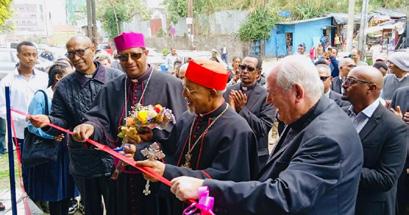
The building was officially inaugurated by His Eminence Cardinal Berhaneyesus Demerew Souraphiel CM, Archbishop of Addis Ababa, with Catholic Mission National Director, Fr Brian Lucas, and other clergy dignitaries in attendance. Fr Brian highlighted the significance of the project:
Being here today was important for Catholic Mission to celebrate the inauguration of this life-changing project... We know that its impact will be carried on for many years to come and will enable many youths to access quality education, creating their own future.”
This model offers a powerful alternative to relying solely on donations and tuition fees. It ensures that education funding can grow with the needs of the school and the community, while also engaging local businesses that benefit from the commercial space.
Fr Tekle Mekonene, Project Director, underscored the wider impact: “The children are more affected by poverty and social problems, and we believe that the quality of education and job creation to generate income for their families are the main tools to accelerate the efforts of alleviating the problem.”
Through impact investing, Catholic Mission and its partners are not only supporting individual students but are building a sustainable, community based solution to educational inequality. The Lideta project stands as a shining example of how mission driven investing can unlock potential, dignity and hope for generations to come.
This image:
Cardinal Berhaneyesus Demerew Souraphiel CM with Catholic Mission National Director Fr Brian Lucas and other dignitaries at the opening of a multi-storey commercial building, established to help fund more than 80 one-year scholarships annually.
Philanthropy
Mary and Joseph
Mary and Joseph are a devoted couple who have long supported Catholic Mission, with their journey beginning in 1992. In 2016, they decided to dedicate their support to a project in Kampong Cham, Cambodia. It became their own personal venture, giving them a renewed sense of purpose and a meaningful way to live out their faith in action.
“We were inspired by the annual Church appeals made by Catholic Mission,” they shared. “These appeals invited us to consider giving a regular monthly amount, which we did. As the years went on, and our life was upended by the loss of our son, we found comfort in giving to overseas mission outreach projects, knowing we could help people in need.”
“In time, we spoke with Catholic Mission representatives about creating a memorial for our late son. A suggestion was made that a multi purpose community centre was needed in Kampong Cham, Cambodia. Inside the centre, a plaque in memory of our dear son was installed. This marked the beginning of a new venture, not just our regular monthly giving, but a project that was deeply personal and close to our hearts.”
“Following this project, we visited Cambodia and became involved in several other initiatives over the years. One of these was the Lonely Tree Café in Battambang, which employs people with disabilities giving them dignity and the ability to support their families. A later visit led to our support of the Oh Battambang Boutique Hotel project, supported and guided by Bishop Enrique Figaredo Alvargonzález SJ, where more people are being trained and employed, again with the aim of restoring dignity and enabling them to support themselves and their loved ones.
“Having the privilege to visit the projects on the ground and meet with the community, we brought our daughter and grandchildren with us, as we wanted to show them what faith in action can mean, and hopefully spark faith in their hearts.
“Over the years, we have contributed to many annual projects in countries such as Myanmar, Ethiopia, Mongolia and Timor Leste, to name a few. We felt compelled to support the incredible work being done to preserve life and promote respect for every human being. We firmly believe it is not enough to feed a person in need, but more importantly we must also give them the tools to support themselves in the future.
“Another important aspect of Catholic Mission is the training of seminarians for the priesthood. In our own community, we have witnessed a
rapid decline in local vocations, and many of our parishes are now led by priests who have come from missionary countries such as Africa, South America, Sri Lanka and India.
“Projects like St Peter and Pauls Major Seminary in Dili in 2014 inspired us to support this vital part of mission outreach, helping to ensure a future in faith for our children and generations to come. As for the legacy we hope to leave behind, it is our prayer that the little we do now will continue to grow and bear fruit for future generations.”
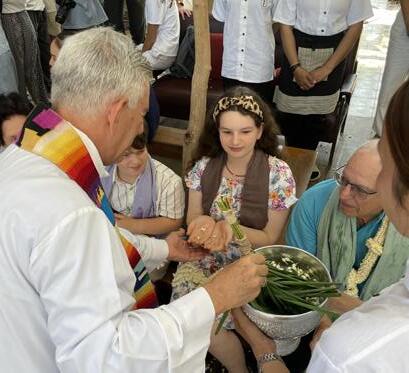

Bottom image:
The plaque dedicated to Mary and Joseph’s son, whose life inspired their commitment to helping others.
Top image: Joseph and his granddaughter share a sacred moment with Bishop Enrique during a traditional Cambodian ceremony, honouring faith, family and culture.
Supporting Teacher Education in Myanmar through Crisis Recovery
Home to 54 million people, Myanmar, a Southeast Asian country, shares its borders with Thailand, India, China, Bangladesh and Laos. In recent years, Myanmar has faced significant upheaval.
Decades of military rule, followed by a brief window of democratic progress, gave way to a military takeover in 2021. The country has since experienced widespread unrest, internal armed conflict, mass displacement and natural disasters, including the COVID pandemic and a major earthquake. These events have severely disrupted daily life, particularly access to education, with many schools forced to close or adapt under challenging conditions.
Throughout these challenges, it has been our mission to remain a steadfast partner to the Pyinya Sanyae (PS), helping to ensure that teacher education and community based learning continue to reach those who need it most.
Founded in 2007, PS was established to expand access to teacher training across the country, particularly in underserved and remote areas. Its mission is to form educators who serve not only as teachers but also as community leaders and changemakers. Since its inception, more than 200 teachers have graduated from PS, impacting the education of about 10,000 students across Myanmar.
“Our teachers, who are formed not just to teach but to also be change agents wherever they are, bring hope and positive contribution to the people in distress and living in fear and hopelessness,” shared Auxiliary Bishop Noel Saw Naw Aye of Yangon Archdiocese and Project Director of PS.
Throughout the COVID pandemic, the 2021 military takeover and most recently, the earthquake, Catholic Mission has walked alongside PS. In each instance, the Institute adapted quickly by delivering at home learning, supporting displaced communities and maintaining vital training programs. After years of disruption, the return of face to face classes marks a significant step forward for students and teachers alike.
Thanks to the ongoing generosity of our supporters, these efforts continued without interruption. Community teachers, trained through PS, play a crucial role in keeping education alive in their regions.

This image: Thanks to PS, dedicated educators like this Sister are bringing the life-changing gift of education to children in remote communities of Myanmar.
Empowering Mongolia’s Future through Vocational Education
With growing demand in the engineering sector, Mongolia is struggling to produce enough graduates to meet national needs. One of the main challenges is the significant barriers to education. In a country where 27 per cent of the population lives below the national poverty line, and a large proportion is under the age of 34, access to education is vital for creating lasting change.
The Salesians of Don Bosco first opened the Don Bosco Vocational Training Center in 2001 to provide educational opportunities to all students, regardless of their background. Starting with just 30 students, the Center can now accommodate more than 250 students each year. It offers training in electrical work, auto mechanics, welding, industrial sewing, plumbing and office administration. All students also study computer literacy and English.
“The professions we need now (in Mongolia) are engineers and technicians in railway construction, oil production, renewable energy, mining processing, transportation and logistics, nanotechnology, information technology and industrial automation engineering,” shared Br Andrew Tran Le Phuong SDB, School Principal.
By training young Mongolians in these fields, the program helps lift families out of poverty, as these skills are in demand and can lead to long term financial stability.
It is also essential to invest in local labour, as Mongolia’s extreme weather conditions make it difficult to attract workers who can endure the climate. By equipping Mongolians, who already have the knowledge and lived experience of their environment, with relevant skills, production lines are less likely to be disrupted.
Catholic Mission began supporting the project in 2023 through a four year initiative to renovate the ageing facilities, which have been in continuous use for the past 25 years. The upgrades will provide students with access to more modern equipment, making them more competitive in the job market.
As we continue our journey in renovating the vocational training centre, we maintain support for many students who will one day be able to give back to their community, creating a long term impact.

This image: Inspiring young minds, a teacher prepares to guide her students in designing and creating their own handmade T-shirts at the Don Bosco Vocational Training Center, Mongolia.
Financials Snapshot
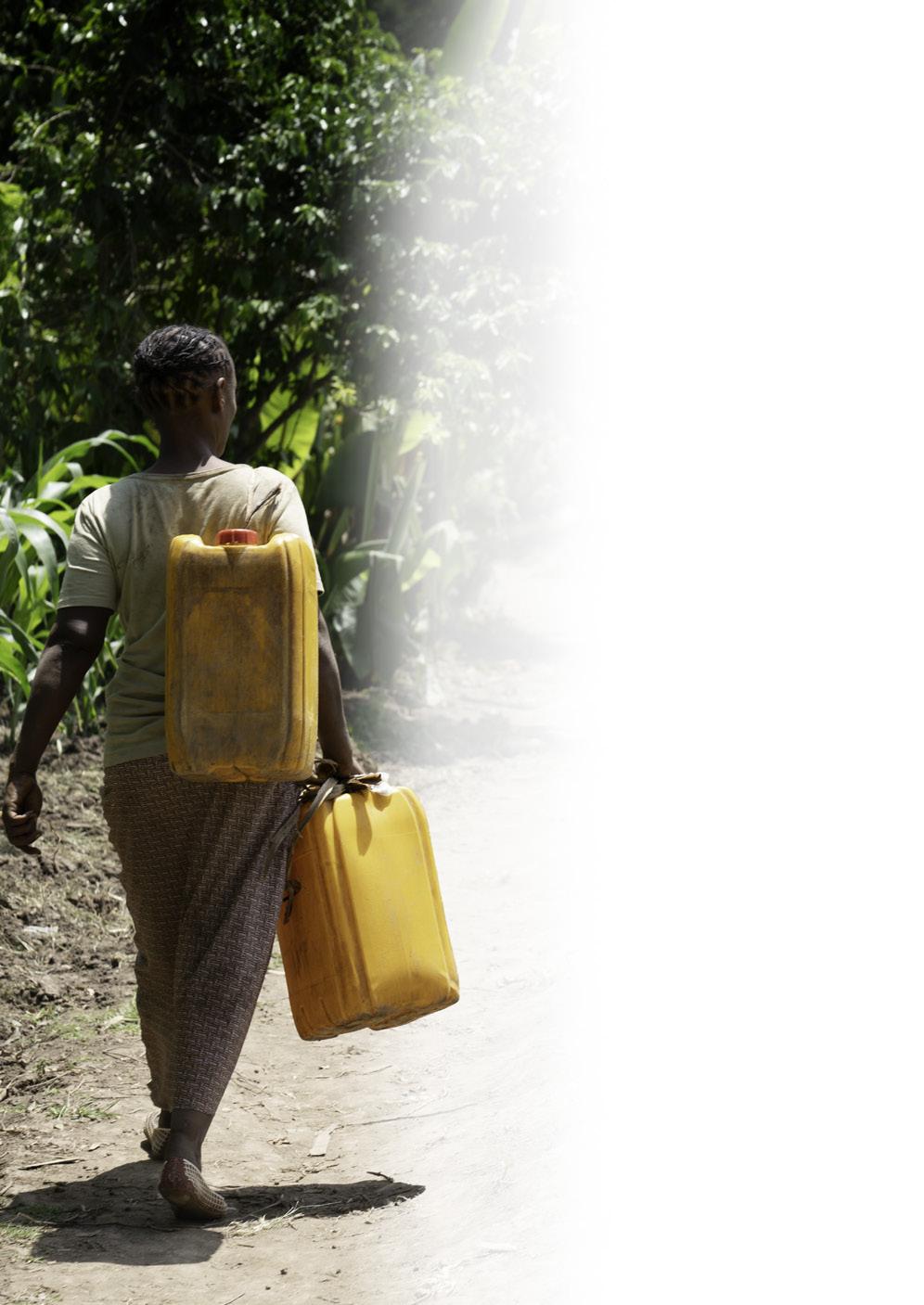
To read our full financial report please scan the QR code or go to catholicmission.org.au/financia l-s tatement-2024
This image: A mother in Zambia walks long distances each day to collect clean water for her family.
Strengthening Mission through Presence and Partnerships
The work of Catholic Mission is to empower communities so that, once we step back, they continue to thrive with the tools and knowledge to carry their mission forward. With this vision in mind, the Regional Mission Development Office (RMDO) was established in Phnom Penh, Cambodia, in 2019.
Functioning as a central hub across Asia, the RMDO strengthens Catholic Mission’s engagement with project partners by providing localised technical assistance and building capacity in mission development throughout the region. It also helps identify new opportunities for life giving projects and supports the effective delivery of these initiatives on the ground.
Pisey Soeurn is the International Programs Coordinator and works closely with local and international partners across Asia and the Pacific, supporting projects in countries such as Mongolia, Thailand, Laos, Myanmar, Timor Leste and Tonga.
“One of the highlights in my job is discovering new opportunities for projects and ensuring they make a real, positive impact,” he said. “Monitoring and evaluating our progress is another key part of what I do... to ensure that projects are delivering the expected impact in the community.”
Lawrence Gigliotti, Director of Programs at Catholic Mission, added: “Being directly present on the ground and geographically accessible to many of our partners in Asia is essential for delivering our work effectively”.
The RMDO also plays a critical role in capacity building.
As Pisey explained, “Working towards capacity building with our partners is crucial in helping them expand their thinking and address gaps, issues and resource needs within their communities and dioceses... we empower them to effectively address challenges and create sustainable, long term solutions”.
With three local Khmer staff trained to deliver ongoing support, the office ensures a culturally grounded and sustainable approach.
“Working directly with partners and missionaries on the ground is crucial because it allows us to have a direct and meaningful impact on local communities,” Pisey said.
The RMDO also hosts immersion groups, helping Australians experience the mission firsthand.

I enjoy facilitating staff trips, welcoming donors, and leading immersion programs... they enable people from Australia to discover the mission work done on the ground and how their contributions make an impact here,” Pisey said.
Reflecting on his time with Catholic Mission, Pisey added: “It’s a privilege to be part of something that brings real positive change to people’s lives”.
This image: Pisey Soeurn, Catholic Mission International Programs Coordinator at the RMDO, and Bishop Olivier Schmitthaeusler M.E.P., Vicar Apostolic of Phnom Penh.

